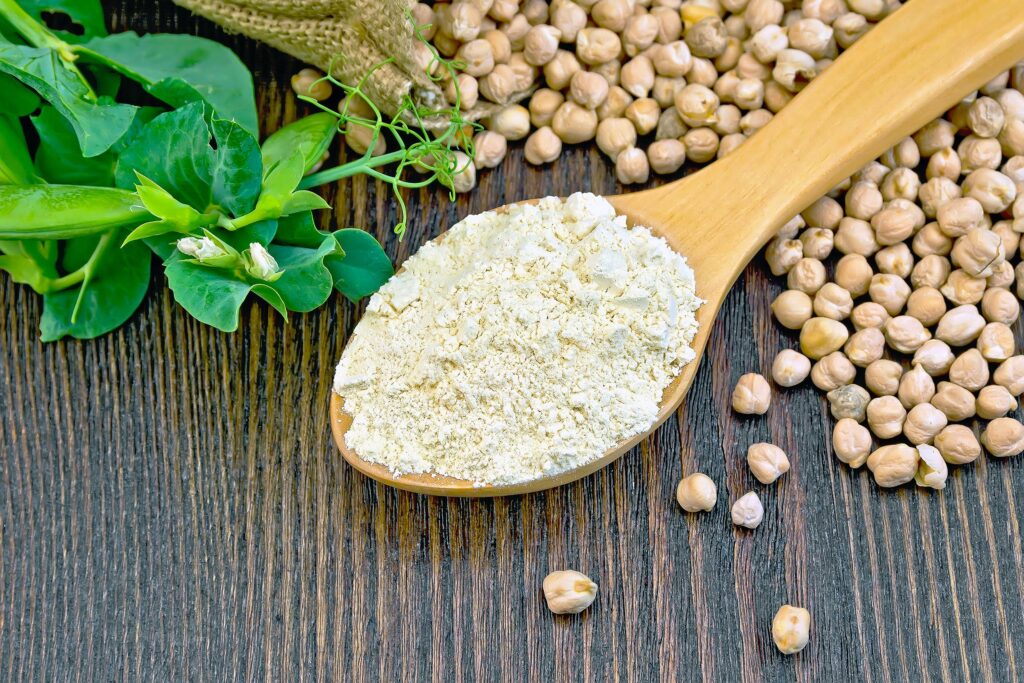
Flour chickpeas in spoonful, chick-peas in a sack and fresh pea pods on a background of wooden boards
For decades, scientific studies have suggested that calorie restriction could be a key to longevity, as evidenced by research on mice, monkeys, and even roundworms. However, the idea of enduring perpetual hunger is far from appealing to most, and adherence to such strict dietary regimens often falters amid life’s celebrations and social gatherings.
Researchers at the University of Wisconsin have delved deeper into the mechanics of calorie-cutting and discovered that while reducing calorie intake does promote longevity in animals, the composition of the diet is equally crucial. This revelation shifted the focus to proteins, which are composed of 20 common amino acids, nine of which are essential and cannot be synthesized by the body.
Protein Quality Over Quantity
Early research indicated that reducing total protein intake might mimic the benefits of calorie restriction without the accompanying hunger. Mice on a modest protein diet exhibited improved blood sugar control and reduced body fat, but indiscriminate protein reduction risked muscle loss, particularly in older animals. A more targeted approach was necessary.
Metabolism researcher Dudley Lamming addressed this gap by asking a novel question: could specific amino acids, rather than protein as a whole, hold the key to longevity? “We like to say a calorie is not just a calorie,” Lamming explains. “Different components of your diet have value and impact beyond their function as a calorie, and we’ve been digging in on one component that many people may be eating too much of.”
Cutting Back on Isoleucine
Lamming’s team focused on branched-chain amino acids—leucine, isoleucine, and valine—commonly found in sports supplements for their muscle-building properties. By isolating each amino acid, they identified isoleucine as a significant factor. Mice equivalent to 30 human years were fed a diet reducing isoleucine by about two-thirds, leading to rapid fat loss.
“Very quickly, we saw the mice on the reduced-isoleucine diet lose adiposity – their bodies got leaner, they lost fat,” says Lamming.
Despite an increase in calorie intake as the mice sought the missing amino acid, their metabolisms accelerated enough to maintain weight loss. Over time, male mice lived approximately 33% longer, while females saw a 7% increase in lifespan. The benefits extended beyond longevity, with improved blood sugar regulation, stronger muscles, and fewer signs of frailty across multiple health metrics.
How Isoleucine Shapes Lifespan
Most aging research intersects with mTOR, a cellular sensor sensitive to amino acid levels. Reducing isoleucine intake quiets mTOR, diminishing growth signals that contribute to tumor formation and aging. The diet also enhances a hormone that aids in cold adaptation and is being studied as a potential diabetes treatment. The interplay of these pathways, though not fully understood, likely explains why targeting a single nutrient outperforms broader protein reductions in middle-aged mice.
“Previous research has shown lifespan increase with low-calorie and low-protein or low-amino-acid diets starting in very young mice,” Lamming explains. “We started with mice that were already getting older. It’s interesting and encouraging to think a dietary change could still make such a big difference in lifespan and what we call ‘healthspan,’ even when it started closer to mid-life.”
Isoleucine and Human Health
While humans require isoleucine for essential functions like hemoglobin production and immune defense, many Western diets provide more than necessary, with foods like eggs, cheese, soy isolates, chicken, and beef being common sources. Surveys in Wisconsin reflect national data, showing a correlation between higher body-mass indexes and increased isoleucine intake.
“We can’t just switch everyone to a low-isoleucine diet,” Lamming continues. “But narrowing these benefits down to a single amino acid gets us closer to understanding the biological processes and maybe potential interventions for humans, like an isoleucine-blocking drug.”
The team’s nutritional modeling suggests that increasing consumption of fruits, vegetables, and moderate portions of animal protein can reduce isoleucine intake without complex dietary changes.
Human Trials Come Next
The study’s use of a genetically diverse strain of mice, more akin to human genetic variety than typical lab inbreds, boosts confidence in the applicability of these findings to humans. However, controlled human trials are necessary to confirm the results. Researchers are investigating whether temporary reductions in isoleucine, similar to the popular five-day fasting-mimicking diet, can yield similar metabolic benefits without long-term restriction.
“It could be that by choosing healthier foods and healthier eating in general, we might be able to lower isoleucine enough to make a difference,” Lamming surmises.
While awaiting definitive guidance, nutritionists advise focusing on legumes, whole grains, and vegetables, which naturally contain less isoleucine than dairy or red meat. This dietary shift aligns with broader public health recommendations to reduce the risk of chronic diseases.
Eat Right, Feel Good, Live Longer
In conclusion, achieving longevity has always depended on balancing nutritional needs with minimizing wear and tear on the body. The latest research suggests that reducing a single amino acid could extend lifespan without compromising dietary satisfaction. Transitioning from laboratory findings to everyday dietary habits won’t happen overnight, but the path is clearer now than when the conversation began with simply “eat less.”
These comprehensive studies were published in the journals Cell Metabolism and Nature Aging.
Like what you read? Subscribe to our newsletter for engaging articles, exclusive content, and the latest updates. Check us out on EarthSnap, a free app brought to you by Eric Ralls and Earth.com.




